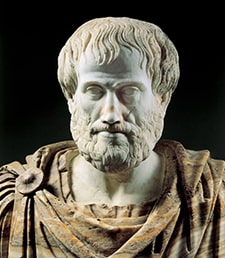In his Peri hermeneias, translated into Latin as De interpretatione, the ancient Greek philosopher and scholar Aristotle argued that “spoken signs are symbols of affections in the soul, and written signs are symbols of spoken sounds. And just as written signs are not the same for everyone people, and pronunciation sounds are not either, but what applies in the first place to all signs – that they are affects of the soul – applies to all people, and that all these affects are likenesses of actual things – is also the same for all” (cited by Noth 1990, 90b).
Aristotle’s enormous influence on late medieval thinking, first on Arabic and later on European, secured him a significant place in the history of semiotics, as it was characteristic of this era that signs were studied in great consistency and in full detail in the context of logic.
Charles Peirce, who calls Aristotle the greatest human intellect, advised people to dissolve the “dusty manuscripts” of medieval logicians.


